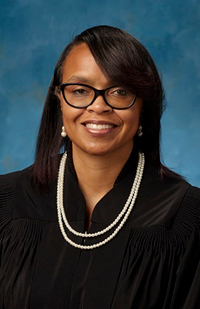Supreme Court Network Developing Attorneys Into Judges

Judge Andrea Nelson Moore credits much of her transition to the bench to her fellow judges and the Ohio Judicial College.

Judge Andrea Nelson Moore credits much of her transition to the bench to her fellow judges and the Ohio Judicial College.
The legal profession is a never-ending journey of learning.
Cleveland Municipal Judge Andrea Nelson Moore is among the 33 attorneys making the transition to the bench with help from the Supreme Court of Ohio at its most recent new judges’ orientation.
“I’m learning how to find my place in the system and there are so many peers and others willing to help,” said Judge Nelson Moore.
The native Clevelander has a well-rounded resume for understanding all sides in a courtroom. She’s been a criminal defense attorney, assistant prosecutor, judicial staff attorney, and magistrate. The challenge is balancing all those viewpoints and focusing on the facts of each case.
“It's no longer my position to advocate,” said the Judge. “It’s now my job to sit, listen, and make a decision based on the evidence.”
The orientation – run by the Supreme Court’s Judicial College with the support of sitting judges who educate as volunteer faculty – gives newly elected and appointed judges specific training twice a year to handle administrative and courtroom responsibilities, including judicial presence and professionalism.
The idea of treating all who appear before the court with respect and decency has stuck with Judge Nelson Moore throughout her life and career after witnessing what happened to a loved one. As a child, she knew her uncle had mental health issues – saying he was eventually diagnosed with schizophrenia. During one of his episodes, he committed a violent crime. It was surprising to the then eight-year-old to see and hear how a judge vilified this man with his tone, calling her uncle “an animal.”
“That moment is what inspired me to become an attorney, to show that we can do a better job in how we administer justice,” said the judge.
While she has ambitions to eventually start a mental health court, Judge Nelson Moore knows there is a lot more to learn. That growth can come through technical instruction from the Judicial College that explains timeframes and timeliness for case management and new ways to use technology as part of proceedings. Guidance also comes in the form of a mentor judge. Each new judge is paired with a seasoned jurist who serves as a resource beyond orientation.
For Judge Nelson Moore, her orientation classmates also act as a support system. Her peers’ different backgrounds and the various sizes of court operations present numerous ideas and options to pursue.
That sense of community is crucial for judges, especially those on the trial court, like Judge Nelson Moore. Even though she is solely responsible for what happens in her courtroom, there’s an entire network devoted to helping her and the next wave of judges.
“Whether it’s the judges or the Judicial College, there’s not much I’m going to see that they haven't already seen,” said the Judge. “We’re all trying to find a better and more cost-effective way to provide justice.”
The Judicial College provides legal education courses for judges, magistrates, court personnel, and guardians. For more information, you can access the Judicial College’s webpage.

